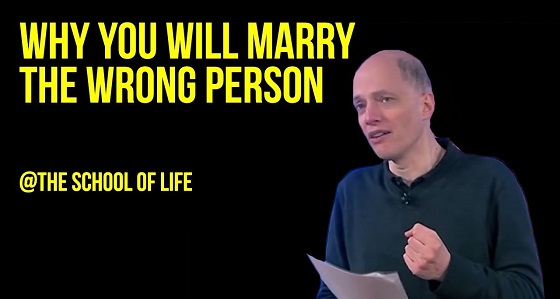We all have a couple that we know that doesn’t seem like the best fit. They stick together through thick and thin but are always arguing, bickering and getting on each others nerves. It’s like they thought they didn’t have any other options so they just choice the one closest to them. Friends, family, colleagues, whoever they are. Maybe it’s you! Sometimes these couples are funny because they bicker over the silliest nonsense that others wouldn’t even bat an eye over.
Relationships are one of the most challenging dynamics in life. You take two ego’s, two hearts, to minds and two souls and you meld them together to form one union. A sacred union that says ’till death do us part’ it’s quite a commitment. Marriage isn’t for the faint of heart.
I stumbled on this speaker by the name of Alain De Bottom, the creator of the ‘school of life’ youtube channel boasting an impressive 7.26 million Youtube subscribers, and for good reason. In this speech he discusses why you married the wrong person.
He begins the talk asking the crowd “How many of you in the room do feel on balance that you have married the wrong person? Okay, a couple people. 5, 10. I’d say 30 people in the room but we have to triple that. So there’s a hefty majority.”
Alain continues.. “You know I’m here to give counsel and consolation for this situation. You know, there’s a lot of anger around our love lives privately held. But a lot of us going around feeling enraged. Quite angry, privately about the way that our love lives have gone.
“My task today is to turn that anger into sadness.” Crowd laughs.
“If we manage to turn anger into grief, we’ll have made psychological progress.”
“Scratch the surface of any angry person and you will find a wild optimist.” He adds.
He continues..
“It is in fact hope, that drives rage. Think of a person who screams every time they cannot find their house keys or every time they get stuck in traffic. These unfortunate characters are evincing a curious but reckless faith in a world in which keys never go astray. The roads are mysteriously traffic free. It is hope that is turbocharging their rage. So if we were to get a little less sad and a little less angry about our love life, we will have to diminish some of our hope.”
“It’s very hard to diminish hope around love because there are vast industries that are designed to inflate our expectations of love. There was a wonderful quote from the German philosopher Theodor W. Adorno that stated that in the 196’s the most dangerous man in America was Walt Disney, and the reason for his attack on Walt was because he believed that Walt was the prime agent of hope and that therefore of rage and therefore of bitterness. He thought it was the task of philosophy to let us down gently. Which is what I’m going to be doing today.”
Alain Continued..
“Remember the theme of the talk ‘why you will marry the wrong person’ There are a number of reasons why this is going to happen to you or why this has already happened in the privacy of your heart. I should say that it’s not that bad, and the reason is that all of us will not manage to find the right person, but we will all of us manage to find a good enough person, and that’s success. One of the reasons is that I’m very strange. You’re very strange. We’re very strange. We are basically psychologically quite strange. We don’t normally know much about this strangeness. It takes us a really long time to know that we’re on top of way in which we are hard to live with.”
Alain digs a bit deeper..
“Does anyone in this room think that they are easy to live with? On balance?” One individual raises their hand.
Alain: “I don’t mean to be rude, but come and see me afterwards. I know that you’re not easy to live with!” The crowd laughs.
“I know that you’re not easy to live with because you are homo sapiens and therefore no one is.”
“There’s a wall of silence that surrounds us from a deeper acquaintance about what is so difficult about us. Our friends don’t want to tell us, they just want a pleasant evening out. A stranger might learn more about your flaws than a friend will know over 40 years of your life on the planet.”
“Our capacity to intuit what is wrong with us is very weak.”
“Our parents don’t tell us too much. They love us too much, why would they? They know, they conceived, I mean, they’ve followed us from the crib. They know what’s wrong with us, they’re not going to tell us. Because you know, they just want to be sweet. Our ex-lovers. a vital source of knowledge. They know. They absolutely know. But do you remember when they said they needed space, they were interested in traveling in southeast Asia. Nonsense, they knew lot’s of things were wrong with you but they just weren’t going to tell you. They were just off, out of there. Why would they bother?”
Alain continues..
“So there’s knowledge that is out there but it’s not in you.”
Therefore we progress through the world with a very low sense of what is actually wrong with us. Not least, addicts, almost all of us are addicts. Not injecting heroin, as such. But addicts in the sense that, we need to redefine what addiction is. I like to define addiction not in terms of the substance you’re taking. In other words, I’m a heroin addict. I’m a cocaine addict. No! Addiction is basically any pattern of behavior whereby you cannot stand to be by yourself and be with the more uncomfortable thoughts, and more importantly emotions, that come from being on your own.
And so therefore you can be addicted to anything, so long as it keeps you being away from yourself. As long as it keeps you away from self-knowledge, and most of us our self-addicts.
Thanks to all sorts of distractions and technology. We can most certainly have a good life but not spend any time with ourselves. Except for maybe certain airlines that don’t have the gadgets that distract us, but otherwise you can be guaranteed you don’t have to talk to yourself and this is a disaster for your capacity to have a relationship with another person.
Because until you know yourself, you cannot properly relate to another person. One of the reasons love is so tricky for us is because it requires us to do something we really do not want to do. Which is to approach another human being and say “I need you, I wouldn’t really survive without you. I’m vulnerable before you.”
There’s a very strong impulse in all of us to be strong, to be defended and to not reveal our vulnerability to another person. Psychologists talk about two patterns of response that tend to crop up in people whenever there’s a danger to being extremely vulnerable, dangerously vulnerable and exposed to another person.
The first response is what psychologists call “anxiously attached” So when you are anxiously attached to someone rather than saying “I need you, I depend on you.” You start to get very procedural. You say “mm, you’re 10 minutes late” You start to get strict when actually what you want to do is ask a very poignant question such as “Do you still care about me?”
We don’t dare to ask that question, so instead we get nasty. We get stiff. We get procedural. The other pattern that psychologists have identified is for people here. This applies to very A-types, out going types, strivers. You become, tell me if I’m wrong, avoidant. Which means that when you need someone, you precisely pretend at that moment that you don’t. In other words, you don’t reveal the need for another person.
Which sets them off into a cycle of whether or not you are to be trusted, which sets them off on a cycle wondering if you are being trusted. This leads to a cycle of low-trust.
We get into these patterns of not daring to do the thing we need to do. I’m a grown person. I have a beard. Maybe I’ve been alive for a long time. I’m 6’2″ etc. I’m actually a small child inside. I need you like a small child needs a parent. This is so humbling that most of us refuse to make that step and therefore refuse the challenge of love.
In short, we don’t know very much how to love, and it sounds very odd because especially if someone says to you “Look, all of us in this room would probably need to go to a school of love. We’d think what? A school of love? Love is just an instinct. No it’s not. It’s a skill. It’s a skill that needs to be learned. And it’s a skill that our society refuses to consider as a skill.
We are meant to always just follow our feelings. If you always follow your feelings you are most certainly going to make a big mistake in your life.
“What is love? Ultimately love, I believe. By the way, there’s a distinction between loving and being loved. We all start out in life by knowing a lot by being loved. Being loved is the fun bit. That’s when someone brings you something on a tray and asks how your day at school went. We grow up thinking that’s what’s going to happen in an adult relationship. We can be forgiven for that. It’s an understandable mistake. But it’s a very tragic mistake, and it leads us to not pay attention to the other side of the equation which is to love.”
What does it really mean to love? To Love, ultimately is to have the willingness on the surface to interpret someone’s not so appealing behavior in order to find more benevolent reasons why it may be unfolding. In other words, to love someone is to apply charity and generosity of interpretation.
Most of us are in dire need of love.
We need to have some slack cut for us, because our behavior is often so tricky because if we don’t do this we’re not getting through any kind of relationship.
The core of what love is is to willingness interpret another’s behavior. What we tend to be very bad at is recognizing that anyone we can love is going to be a mixture of the good and the bad. There’s a wonderful psychoanalyst called Melanie Klein, who was active in the 50’s and 60’s, originally from Vienna, active in North London who studied about how children learned about relationships from the parental situation.
She came up with a very fascinating analysis. She argued that when children are small, very small, they don’t actually realize that a parent is one character. What they do is they split the parent into a ‘good parent’ and a ‘bad parent’ and so this is when a baby is really at an infant stage. So what you do is you split into the ‘good mother’ and the ‘bad mother.’ It takes a long time, until the child is about 4 years old that they realize the good and the bad mother are one, and they become ambivalent. In other words you’re willing to hate someone, and at the same time willing to love them.
You’re able to love someone and hate someone and not run away from that and say ‘that’s okay.’
Melanie Klein thought that this is an immense psychological achievement. We can no longer divide people into absolutely brilliant, what perfect marvelous and hateful, let me down, disappointed me. Everyone who we love is going to disappoint us. We start off with idealization. And we end up often with denigration. The person goes from being absolutely marvelous to absolutely terrible.
Maturity is the ability to see that there are no heroes or sinners really among human beings.
All of us have this perplexing mixture of the good and the bad. And adulthood, true psychological maturity, and you may need to be 65 before it hits you is this understanding that anyone that you love is going to be a mixture of the good and the bad.
To love is not just admiration for strength, it is toleration for weakness, and recognition for ambivalence.
The reason why we are going to probably make some real mistakes when we choose our love partners, some of you in this room have made stunning mistakes. Why is this? The reason is that the way we’ve been told to find a good partner is to follow your instinct. Follow your heart. That’s the mantra. And so we’re reminded all the time that if we stop reasoning, analyzing, are there people in this room that can think too much about your emotions? You cannot think too much. But you can think too badly. But there’s no such thing as thinking too much about emotions but the problem is we live in a romantic culture where privilege is impulse. When it comes to love, something tricky occurs.
The way we love as adults sits on top of our early childhood experiences.
In our early childhood, the way that we learned about love was not just via experiences of kindness, tenderness and generosity. The love that we tasted as children will also be bound up with experiences of being let down, being humiliated, maybe being with a parent that treated us very harshly. Who scolded us, who made us feel small in some way. In other words, part of our early experience with love are bound up with various kinds of suffering. Now, something quite bad happens when we go out into the world and start to choose love partners.
If you’re enjoying this talk, start the video below to finish the rest.
Watch The Full Presentation Here:
Alain De Bottom is the author of “The Course Of Love: A Novel” which can be purchased on Amazon by clicking here.





